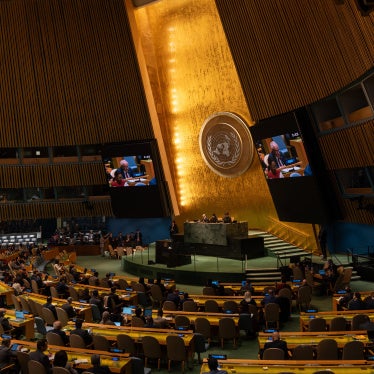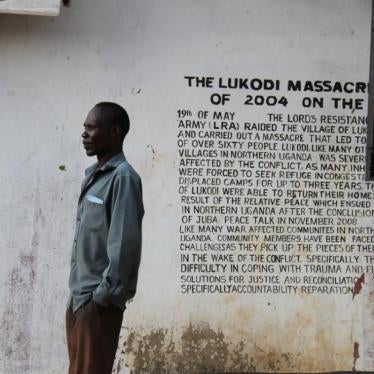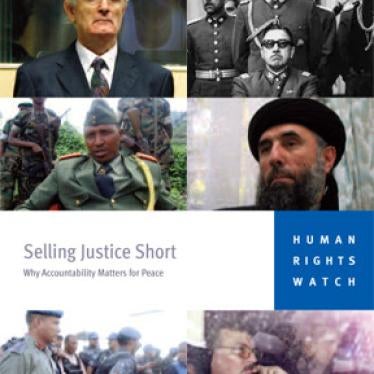To Ministers of Foreign Affairs
States Parties to the International Criminal Court
Dear Excellency,
We are writing during the present nomination period for candidates for election as judges to the International Criminal Court (ICC). For the court to succeed, Human Rights Watch strongly believes it is essential that ICC states parties nominate the most highly qualified candidates. For us, this includes prioritizing nominees with established competence in criminal law and significant criminal trial experience. We have recommendations as to both the process and substance of nominations.
Your Excellency,
We are writing during the present nomination period for candidates for election as judges to the International Criminal Court (ICC). For the court to succeed, Human Rights Watch strongly believes it is essential that ICC states parties nominate the most highly qualified candidates. For us, this includes prioritizing nominees with established competence in criminal law and significant criminal trial experience. We have recommendations as to both the process and substance of nominations.
As you know, the ICC states parties will elect six judges at the seventh resumed session of the Assembly of States Parties in January 2009 in New York.1 The period for nomination of candidates for election opened on July 21 and will close on October 13, 2008, barring an extension. These six judges will be elected to nine-year terms and their service will greatly influence the work of the court for many years to come. We thus attach the highest importance to developing the deepest, strongest pool of judicial candidates possible.
The process of nominations is itself significant. We encourage states parties to adopt transparent and vigorous means for the nomination of candidates. Parliaments, the legal profession, and civil society have an important role to play in ensuring the identification of all qualified candidates and the nomination of the most qualified.
We also strongly urge the Assembly of States Parties to act under article 36(4)(c) of the court’s statute to create an advisory committee on nominations to provide guidance to the nominations process. Such a committee would be of value in the present election cycle and would have continuing importance in the next scheduled election of judges in 2012 and beyond.
When it comes to the substance of nominations, the court’s statute identifies several criteria to guide ICC states parties in selecting judges. Article 36(3)(a) provides that “the judges shall be chosen from among persons of high moral character, impartiality and integrity who possess the qualifications required in their respective States for appointment to the highest judicial offices.” In addition, states parties must adhere to the requirements enumerated in article 36(8) as to gender, geography, and type of legal system represented, as well as bear in mind the need to include judges with specific legal expertise on issues including violence against women or children.
Of key importance, every candidate for election as an ICC judge must have established competence either in criminal law and procedure (known as “List A” candidates) or relevant areas of international law (known as “List B” candidates).2
Human Rights Watch believes that those elected should have criminal law expertise and prior experience in criminal proceedings as judges, prosecutors, or defense attorneys.3 The ICC is now moving into the trial phase in several of its cases. These trials will be complex and highly charged, and they will necessitate seasoned practitioners to conduct them. Expeditious proceedings that adhere to the full range of international fair trial standards are at the core of the court’s mission; in turn, the practice of other international and hybrid criminal tribunals has shown that criminal trial experience is vital to the judges’ ability to effectively manage the courtroom.
Developing a robust field of candidates with the criminal law experience most relevant to the work of the court is a necessary first step for the election of the most highly qualified judges in January. We thus strongly encourage you to nominate and support candidates with competence in criminal law and significant criminal trial experience. In putting forward nominees, states parties should also bear in mind the other important criteria identified in the court’s statute as outlined above.
Thank you for your attention to this important matter. Given the significance of the election process, Human Rights Watch will be following it closely in the coming months. We look forward to further discussion with you on this in the run-up to November’s seventh session of the Assembly of States Parties.
Sincerely,
Richard Dicker
Director
International Justice Program
[1]. The January 2009 election is occasioned by the March 2009 expiry of the terms of six ICC judges, including Judge Fumiko Saiga of Japan. Judge Saiga, however, is eligble for re-election because she filled a judicial vacancy term of less than three years, and has already been nominated for re-election. In addition, Judge Navanethem Pillay of South Africa has recently resigned from the ICC effective August 31, 2008, to take up the position of United Nations High Commissioner for Human Rights. As Judge Pillay’s term is one of those six expiring in March 2009, the resulting vacancy will be filled in the course of the January 2009 elections.
[2]. Candidates who qualify for both lists may choose on which list to appear.
[3]. Minimum voting requirements ensure that there are least nine List A judges and at least five list B judges on the ICC bench. Among the 12 judges with terms expiring after March 2009, there are eight List A judges and 4 List B judges.







